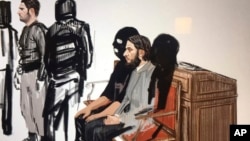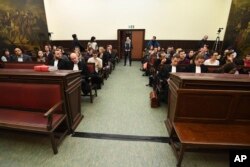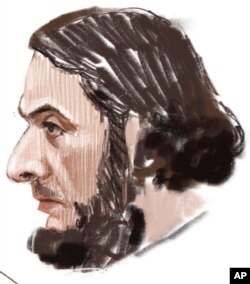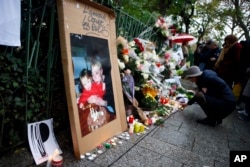Chances faded Monday that a top surviving Paris terror suspect might finally shed light on France's deadliest attack in recent history, as the first trial against Salah Abdeslam opened in nearby Brussels amid tight security and a packed courtroom.
Bearded, long-haired and clad in a white polo shirt, 28-year-old Abdeslam sat mostly silent during opening proceedings at the main courthouse in the Belgian capital. He refused to rise when requested by the judge, and refused to answer questions.
Later, Abdeslam accused the media of unfairly condemning him before a trial, and claimed Muslims were unfairly and mercilessly judged.
"I put my trust in Allah," he said, in remarks reported by journalists present.
This week's hearings do not directly deal with the November 2015 attacks in Paris, which killed 130 people, but rather with a separate shootout with Belgian police that took place several months later. Abdeslam and fellow defendant Sofien Ayari are accused of attempted murder, and if found guilty could face up to 40 years in jail.
Knowledge of wide terrorist network
Belgian criminologist Michael Dantinne described Abdeslam as a potential mine of information for both the Paris attacks and Brussels bombings in March 2016.
During an interview on French radio Monday, Dantinne said of Abdeslam's behavior, "It's not a defense strategy, it's an act of propaganda. Salah Abdeslam is trying to shock public opinion, but he's also trying to enforce radical ideas."
Abdeslam's courtroom appearance contrasted sharply with the boyish, clean-cut photos of him taken just a few years ago. A former petty criminal who helped run a Brussels bar with his brother Brahim, who died in the Paris attacks, Abdeslam seemed like an unlikely jihadist.
Yet Abdeslam is believed to have played a key logistical role in preparing the attacks that were carried out by a French-Belgian Islamic State network of friends and family members that investigators also tie to the Brussels attacks.
Abdeslam allegedly organized safe houses, drove across Europe to pick up other suspects, and dropped off three suicide bombers at the Stade de France soccer stadium outside Paris, where they blew themselves up during a France-Germany game.
The stadium attack was the first in a string of shootings and bombings that took place across Paris on a balmy November evening. The terrorists targeted bars, restaurants and the Bataclan concert hall, before detonating suicide vests or being shot and killed by police.
Beyond any information he can offer investigators, Abdeslam also needs to explain himself to "fellow fanatics and supporters," criminologist Dantinne believes, notably about why he didn't blow himself up like the other Paris attackers. Recent evidence shows Abdeslam's suicide vest was defective, although it remains unclear whether he intended to trigger it.
"That's one reason why he has adopted this radical aspect," Dantinne said of Abdeslam's remarks Monday. "To make himself out as a victim, when the opposite is true."
After the Paris attacks, Abdeslam escaped, sneaking across the French border into Belgium the following day with the help of friends. After a four-month manhunt, he was caught in the Molenbeek neighborhood where he grew up. His capture came soon after a shootout with police, who were investigating a suspected safe house they originally thought was unoccupied.
Days later, three bomb attacks on the Brussels airport and the Maalbeek metro station killed 32 people. Abdeslam, who initially talked to his interrogators, went silent.
Other suspects, other trials
During the Brussels hearings, Abdeslam will be commuting from a high-security prison in northern France. He will experience the same 24-hour video surveillance as in his cell at the Fleury Merogis prison near Paris, which his former lawyer suggested was affecting Abdeslam's mental stability.
The French and Belgian attacks were only the beginning of several killings across Europe that targeted Germany, Britain, Spain and the French Riviera city of Nice. Last month, the first trial relating to the 2015 Paris attacks opened in the French capital. Three suspects are charged with assisting or being aware of the assailants' whereabouts. Others are expected to open over the coming months and years, including those directly related to the Paris attacks.
Philippe Duperron, head of a Paris attacks survivors' group, was among those attending the trial's opening. Given Abdeslam's silence over the past months, he said, he expected more of the same in court.
"There was a very strong emotional charge when Salah Abdeslam walked into the courtroom," added Duperron, whose son died in a hail of bullets at the Bataclan nightclub in 2015. "Being in the presence of one of the alleged perpetrators was a very difficult experience."







